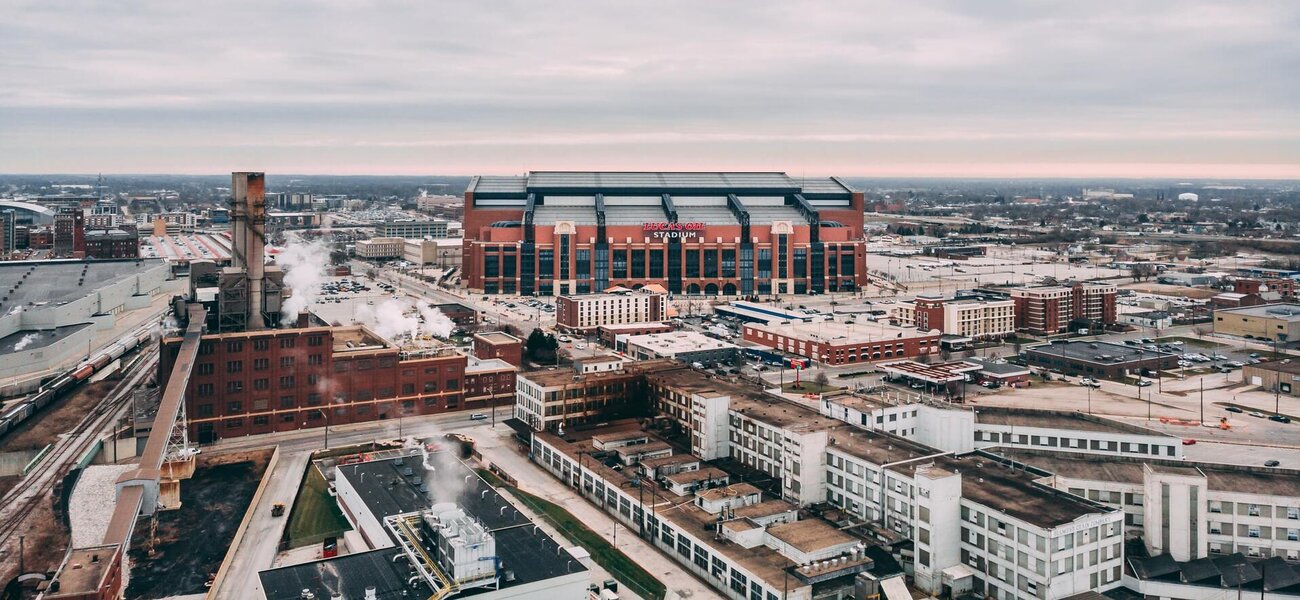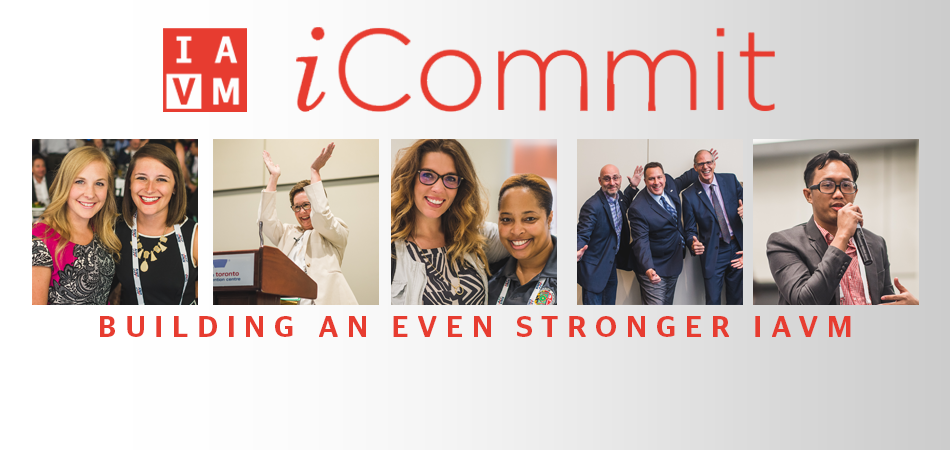Indianapolis Colts Say Full Capacity a Go; All NFL Teams to Have Full Attendnace
By StadiumBusiness
The National Football League (NFL) will open its 2021 season at full capacity after the Indianapolis Colts became the final team to secure clearance for full attendance at its stadium.
Lucas Oil Stadium is set to operate at its normal capacity of 63,000 after the Colts were granted  permission following extensive consultation with the Marion County (Ind.) Public Health Department (MCPHD).
permission following extensive consultation with the Marion County (Ind.) Public Health Department (MCPHD).
As COVID-19 is still affecting the city and state, the Colts said they will continue to be vigilant about keeping fans safe and healthy, but added that most in-stadium protocols from last season will be relaxed or eliminated.
Single-game tickets for the entire 2021 season are on sale now, with the Colts stating that inventory is already very limited for the opening two home games against the Seattle Seahawks and Los Angeles Rams.
“We were fortunate to be able to host fans in 2020 through the pandemic, and those fans were as loud and proud as ever,” said Colts owner and CEO, Jim Irsay. “But gamedays at Lucas Oil Stadium are like family reunions, and it wasn’t quite the same without our entire Colts family alongside us.
“So we can’t wait to open the stadium doors to all our fans so they can take this journey with us as we work to bring a Super Bowl title back to Indianapolis.”
Last season, the Colts were one of the few teams to host fans at every home game. The Colts were ninth in attendance figures last season with a total of 79,560 fans, or an average of 9,945 per game, admitted to Lucas Oil Stadium. Capacities peaked at 12,500 last season.
The NFL appeared to be closing in on its goal of having stadiums at full capacity for its 2021 season last month after it was disclosed that only two teams were yet to receive permission for this course of action.
The NFL 2020 season saw 119 games have fan attendance in some capacity, with around 1.2 million fans in total. Fan attendance was determined by teams’ local COVID-19 restrictions. Notably, the Los Angeles Rams and Chargers (SoFi Stadium), as well as the Las Vegas Raiders (Allegiant Stadium) were forced to play their entire seasons behind closed doors at their new homes.
In March, NFL commissioner Roger Goodell expressed his hope that full capacity would be achieved for the 2021 season and recent weeks have seen a number of teams make announcements to this effect.
At the NFL’s two-day spring meeting, Peter O’Reilly, the League’s executive vice-president of club business and events, stated all but two teams had gained approval from state and local governments to open their stadiums at full capacity for the new season.
The two teams that had yet to receive authorization were the Colts and Denver Broncos. The latter was subsequently granted permission to operate Empower Field at Mile High at full capacity for Broncos fans on June 2.
In May, the NFL announced a return to international play with Tottenham Hotspur Stadium confirmed to host two games during its 2021 regular season, the only outings for the League in the UK this year.
Atlanta Falcons and Jacksonville Jaguars will be the home teams for the games, taking on the New York Jets on October 10 and the Miami Dolphins on October 17, respectively.
UK Test Events Show 90% Drop In Online Ticketing Sales Conversion Rate
By TicketingBusinessNews
Testing requirements could lead to a dramatic drop in ticketing sales conversion according to data released from the Events Research Programme (ERP).
Information garnered from test events held in the UK from April showed a 90% drop in conversion rate among  those visiting ticketing websites, with researchers suggesting this was a result of increased sales friction.
those visiting ticketing websites, with researchers suggesting this was a result of increased sales friction.
In the ‘Operational Learnings’ section of the ERP study, released last week following a legal challenge, researchers found that only 1.7% of site visitors bought a ticket, when previously, without testing requirements, their conversion rate was 18%. It added that users were spending an average of three minutes and 15 seconds reading the terms of entry specifying supervised testing requirements.
Researchers also found higher-than-usual ‘no-shows’ for games held at Wembley Stadium. They added: “This may indicate that people received their tickets and then didn’t want to follow through with the home or supervised testing requirements. Tests for pilot events were free; if consumers had to pay for tests, it would be likely to have a knock-on impact on demand and participation, and could exclude or disproportionately impact some demographic groups.”
As widely reported, the data showed just 28 cases of COVID-19 recorded out of the 58,000 people who attended during the first nine events.
However, while some saw the low number of cases as proof that events could be staged safely, the data also highlighted low levels of compliance with rules of attendance. The proportion of participants returning PCR tests varied between 8% and 74% for the ‘pre-event’ (days -1 to 3) test and between 13% and 66% for the ‘post-event’ (days 4-7) test. This “significantly limited the ability to estimate rates of infection after attending events”.
Researchers found that test return rates were higher for the events where tests were posted to attendees and when an incentive, such as the chance to win free tickets, was offered. “The music festival offered an incentive of the chance to win future festival tickets and saw a three-fold higher return rate of both PCR tests when compared with the Circus Presents ‘The First Dance’ (nightclub) event held on the same weekend with an approximately comparable audience in Liverpool,” researchers found.
“Across all events, of the 15% who returned both PCR tests, there were 28 PCR-positive cases recorded, with 11 considered potentially infected before an event and 17 at or after an event. It should be noted that some individuals were potentially infected before an event despite admittance being conditional on a negative LFT result before the event.”
Pilots highlighted “significant issues” in matching event bookings with test results and wider public health data, except in Liverpool, where an enhanced combined intelligence system is already in place.
“This test to ticket matching requirement underpins the testing and tracing infrastructure,” the report said. “Without it, it is impossible to reliably associate attendees’ test results to events and therefore to reliably operate outbreak prevention and control for events. Given some individuals infected before the event were admitted despite admittance being conditional on a negative LFT result, robust contact tracing capacity is necessary.
“Higher levels of audience participation in testing and thorough data linkage with public health surveillance systems are needed to better understand the transmission risks around events.”
The ERP began with a series of indoor and outdoor events allowing limited capacities in April, including the World Snooker Championship in Sheffield and concerts and club nights in Liverpool.
A second phase of pilot events has completed, with group stage UEFA Euro 2020 matches hosted at Wembley, the Download Pilot music festival, the England v New Zealand test match at Edgbaston and Royal Ascot having taken place this month. Research into the events is still being gathered and analyzed by the ERP science team.
The third phase of the ERP will include Wimbledon Championships, The Open Championship, and Latitude festival.
iCommit 2021 Kicks Off Today!

Gina Brydson, Director of Membership shares that “IAVM’s members are the absolute best at spreading the word about the value of membership. We are grateful for their continued support. Let’s give our network a boost and kick our recovery efforts into overdrive!”
iCommit is a member referral campaign. The challenge is to increase membership by 10%. The official launch is today, July 1st. Start now by reaching out to your employees, colleagues, suppliers, interns and more and encourage them to become an IAVM member!
The campaign runs from July 1 – October 31, 2021. For each new member you refer by the deadline, your name will be entered into a raffle to win one of five, $500 Apple Gift Cards. The more members you refer, the more chances you have to win!
Prizes
- The grand prize will be a complimentary registration to VenueConnect 2022 (value up to $1,000).
- Win one of five, $500 Apple Gift cards – receive one raffle entry for each new member you refer.
- The IAVM Region that adds the most new members will choose one recipient to apply for the CVP designation; we will waive the $125 application fee (the Region Director will choose the recipient within the winning region).
To ensure you are eligible to win one of the prizes, ask your applicant to do the following:
- List your name in the Application Section titled, “Who Recommended IAVM To You/How Did You Hear About IAVM?”
- Enter “iCommit” in the Promotional Code field in the online membership application.
- For new Professional or Allied members only, the $150 one-time initiation fee will be waived*
*Some membership types do not have an initiation fee; the dues will not be discounted.
All winners will be notified in January 2022. Contact membership@iavm.org if you have any questions.
It’s An Encore Call For Dr. Justin Anderson At VenueConnect: Don’t Miss It!
By R.V. Baugus
In performing arts call it an encore. In sports call it overtime or extra innings. In meetings call it extending the hours. Whatever you choose to call it, we call it a return welcome to Dr. Justin Anderson, Founder and CEO of Premier Sports Psychology, as following his outstanding session earlier this year at GuestX he is again on the docket to present at VenueConnect on the topic of Prime the Mind: Top Mindset Approaches to Weather the Pressure of Today’s World. Ask anyone who attended Dr. Anderson’s GuestX session and you will discover why this is a must-attend session coming up in Atlanta.
This will be a highly engaging mindset training session. Participants will hear stories and learn  applicable psychological tools and strategies that the world’s best athletes, coaches, and front office leadership employ to navigate the stressful and chaotic landscape of professional and elite sports. You will learn how to train your mind to think, feel and behave more optimally while under pressure, on-demand, or when fatigued.
applicable psychological tools and strategies that the world’s best athletes, coaches, and front office leadership employ to navigate the stressful and chaotic landscape of professional and elite sports. You will learn how to train your mind to think, feel and behave more optimally while under pressure, on-demand, or when fatigued.
Obviously a speaker in demand, we were fortunate to catch up with Dr. Anderson to ask a few questions in advance of VenueConnect.
We have had you present at GuestX, where your session drew rave reviews. Can you give us a glimpse of what you will be sharing in Atlanta at VenueConnect?
Stories and models aside, I’ll be sharing innovative and impactful tools that all attendees can learn and apply – both in their professional and personal lives. Everything – whether in business or sport – all comes down to how we function, or rather, perform – and it begins with our mindset. Whether it’s the end zone or the bottom line, performance is performance. We can clearly see and measure it. What isn’t always as distinct is what’s occurring internally and how our minds can shape our perceptions and interactions in our day-to-day experiences. We’ll talk about what it means to understand mental health and cognitive functioning in real-world ways so that attendees can optimize not only their own well-being and performance, but support that of those around them.
You work with all levels of teams and leagues, so what can you tell us that will make this session a “must” for folks to attend at it relates to Universities?
Mental health and wellness is a huge topic at universities right now. Studies are showing that our most depressed and anxious populations tend to be our adolescents and young adults – so we’re looking at a critically important group of people in society. Understanding some of the background of where people are coming in and how to manage them – not just from a reactive, but rather, a proactive place – can be a game changer.
How are we now beginning to emerge from the pandemic as it relates to what you see and hear in your daily work?
The epidemic of mental health that America is experiencing doesn’t appear to be improving or changing for the better – and COVID certainly didn’t do anything to help this. Although it feels like we’re nearly “out of the weeds” with COVID, there are new stressors and fears emerging for people. Whereas a year and a half ago, it was life and death to protect yourself and your family, now we see challenges around re-integration and socialization – on top of what COVID has exacerbated. A recent article in Forbes explained that 93% of managers are seeing mental health impacting their employees – and their bottom line, citing, “Top issues included grief, burnout, discrimination, and stress…coupled with the strain on families due to the pandemic…creating a mental health crisis.” We’re seeing a ripple effect throughout our society, our economy and everywhere in between. Our worlds have been up-ended, and we’re going to need more tools and resources for our mental health and well-being if we hope to have any chance of successfully coming out of this on the other side.
We love for our attendees to go home from a session with a solid takeaway that they can implement or act on. What would it be from your upcoming session?
My hope is for attendees to understand just how much our attention impacts everything we do, see, feel, and experience. Most of us have no clue where our attention is, but what we choose to focus on matters and makes a difference. If we can utilize the latest research and models and begin to apply the tools coming out of high-performance psychology, we can move the needle. And if we can move the needle, we can begin to optimize our mindsets to achieve anything we put our focus toward.
Paul Cramer and The Classic Center Literally Invest in The Community: Find Out How at VenueConnect
By R.V. Baugus
Paul Cramer, President & CEO of The Classic Center in Athens, GA, is an IAVM member who understands the importance of workforce development, which may never be more important as it is as events pop back up on calendars and business returns to public assembly venues. As work teams rebuild, Cramer and his venue go the extra mile to attract local candidates who otherwise might not have a window into the industry.
For that reason and many more, Cramer will lead an education session at VenueConnect in Atlanta that needs  to be circled on your calendar to attend. Before Cramer gets before the crowd in Atlanta, we got him before all IAVM members here in an interview to discuss the topic and more.
to be circled on your calendar to attend. Before Cramer gets before the crowd in Atlanta, we got him before all IAVM members here in an interview to discuss the topic and more.
RV: I like the word “funnel” in your session title of Workforce Development: How to Create Sustainable Hiring Funnel for Your Venue. Can you elaborate some on how “funnel” fits in describing the topic?
PC: We used the term funnel as we try to meet people in our community where they are. We live in a community with 30-plus percent poverty so we have people who have little or no education. We have a Bread For Life Program for them, we work with the area career academy allowing high school students to earn college credits with dual enrollment, we have articulation agreements with the local two-year college and four-year university. We try and attract them to the industry and show them how they can get the training they need to be successful in not only acquiring a job but showing them a career pathway. By focusing them on more than a paycheck we have had luck with attracting the right candidates to an industry that is extremely rewarding and offers unique benefits that are simply not offered in other area career pathways.
RV: Talk briefly just about your core philosophies when it comes to education at The Classic Center and then what you were able to do that you are now sharing with others in the industry.
PC: We believe in the continuum of education and meeting people where they are. We call it growing our own. We believe that we need people who have a longer term vision of growing with our industry. We focus on the pathway and encouraging all hires to look down the road and plan a career pathway. Then we assist them with a continuum of education and college scholarship program supported with an endowment which is created in our foundation to support hospitality workforce development.
RV: How did you go about getting your partnerships and how might others sitting in your session do the same at their venues?
PC: We get the community involved. We explain to our donors that this is a way of lifting people out of poverty. We train those in poverty and connect them with jobs. We invite the community to their graduations. We let the students speak out on their accomplishments. Our foundation allows people to contribute to a hospitality endowment. We have raised over 700k in a short period of time which now provides annually for $25k specifically for hospitality workforce development. We also offer unique benefits, great health care, two-for-one match on retirement program, and as a culture we encourage entrepenurial skills. Our partnerships with large affiliate companies also assist greatly. Levy for example is a partner with us and we have great success stories of entry level culinary folks rising up to executive chef positions over a short period of time.
RV: What is the importance of recruiting, retaining, and developing your staff? Do you have numbers that show your success in doing so?
PC: Yes, our Bread for Life program has a 14-year history of receiving federal funding and connecting 98% of our trainees with direct positions. Our career academy has grown from 14 students to 340 students. Our hospitality academy is a summer high school program that has helped to grow our initial two-year college program from nothing to 200 students. Our four-year degree program will now begin to work with the complex to have student interns earning full semester credit in the facility while they work – no stats yet. Fifty percent of our staff have been with us for over five years, and upper management has on average been retained for 15 years.
RV: Are there any major takeaways you would like to leave your audience as they return to their venues?
PC: Meet people where they are and provide real life training that can quickly get them where they need to be. Provide all employees with a long vision of where this industry can take them. Promote the positive aspects of the job and focus on your culture. Truly partner with all levels of education and get your community involved.
Do you want to receive a Front Row News weekly digest?
Categories
- Allied (856)
- Architecture (147)
- Arenas (744)
- Career (890)
- Convention Centers (889)
- Education (608)
- Events (1,528)
- Food & Beverage (193)
- Foundation (113)
- Guest Experience (1,482)
- Industry News (2,253)
- Leadership (1,872)
- Marketing (150)
- Membership (1,985)
- Music (212)
- Performing Arts Centers (453)
- Professional Development (398)
- Research (127)
- Safety & Security (425)
- Sports (763)
- Stadiums (607)
- Student (159)
- Technology (515)
- Ticketing (92)
- Touring (82)
- Trends (357)
- Uncategorized (771)
- Universities (216)
- Video (25)
- Young Professional (198)
Twitter Feed
- Twitter feed loading
Recent Posts
- GEODIS Park Selects Allied Universal As Its Preferred Event Services Provider
- Venuworks Appoints Marc Solis as Executive Director of the Fresno Convention and Entertainment Center
- Los Angeles Convention Center Diverts 8,000 Pounds of Wood Waste to Local Foundation Supporting Fire Victims
- Fort Worth Unveils Plans for Phase 2 of Convention Center Transformation
- San Diego Convention Center CEO Announces Retirement After a Decade of Leadership
Categories
- Allied
- Architecture
- Arenas
- Career
- Convention Centers
- Education
- Events
- Food & Beverage
- Foundation
- Guest Experience
- Industry News
- Leadership
- Marketing
- Membership
- Music
- Performing Arts Centers
- Professional Development
- Research
- Safety & Security
- Sports
- Stadiums
- Student
- Technology
- Ticketing
- Touring
- Trends
- Uncategorized
- Universities
- Video
- Young Professional
Archives
- February 2026
- January 2026
- December 2025
- November 2025
- October 2025
- September 2025
- August 2025
- July 2025
- June 2025
- May 2025
- April 2025
- March 2025
- February 2025
- January 2025
- December 2024
- November 2024
- October 2024
- September 2024
- August 2024
- July 2024
- June 2024
- May 2024
- April 2024
- March 2024
- February 2024
- January 2024
- December 2023
- November 2023
- October 2023
- September 2023
- August 2023
- July 2023
- June 2023
- May 2023
- April 2023
- March 2023
- February 2023
- January 2023
- December 2022
- November 2022
- October 2022
- September 2022
- August 2022
- July 2022
- June 2022
- May 2022
- April 2022
- March 2022
- February 2022
- January 2022
- December 2021
- November 2021
- October 2021
- September 2021
- August 2021
- July 2021
- June 2021
- May 2021
- April 2021
- March 2021
- February 2021
- January 2021
- December 2020
- November 2020
- October 2020
- September 2020
- August 2020
- July 2020
- June 2020
- May 2020
- April 2020
- March 2020
- February 2020
- January 2020
- December 2019
- November 2019
- October 2019
- September 2019
- August 2019
- July 2019
- June 2019
- May 2019
- April 2019
- March 2019
- February 2019
- January 2019
- December 2018
- November 2018
- October 2018
- September 2018
- August 2018
- July 2018
- June 2018
- May 2018
- April 2018
- March 2018
- February 2018
- January 2018
- December 2017
- November 2017
- October 2017
- September 2017
- August 2017
- July 2017
- June 2017
- May 2017
- April 2017
- March 2017
- February 2017
- January 2017
- December 2016
- November 2016
- October 2016
- September 2016
- August 2016
- July 2016
- June 2016
- May 2016
- April 2016
- March 2016
- February 2016
- January 2016
- December 2015
- November 2015
- October 2015
- September 2015
- August 2015
- July 2015
- June 2015
- May 2015
- April 2015
- March 2015
- February 2015
- January 2015
- December 2014
- November 2014
- October 2014
- September 2014
- August 2014
- July 2014
- June 2014
- May 2014
- April 2014
- March 2014
- February 2014
- January 2014
- December 2013
- November 2013
- October 2013
- September 2013
- August 2013
- July 2013
- June 2013
- May 2013
- April 2013
- March 2013
- February 2013
- January 2013
- May 2012
- March 2012
- December 2011
- November 2011
- October 2011
Recent Comments
- Frank Bradshaw, Ph.D., CVE on John Meyer, CVE, a Tireless Advocate of Certification for Venue Professionals, Has Died
- Neil Sulkes on Hilary Hartung, Friend to Many in Venue Marketing, Has Left Us
- Jason Parker, CVE on The Devastation of Hurricane Helene and How We Can Support One Another
- Larry Perkins on Touhey Testifies Against Speculative Ticketing Before Congressional Subcommittee
- Peter Secord on Major Players for Planned Elkhart Amphitheater Were in the Mix at VenueConnect
